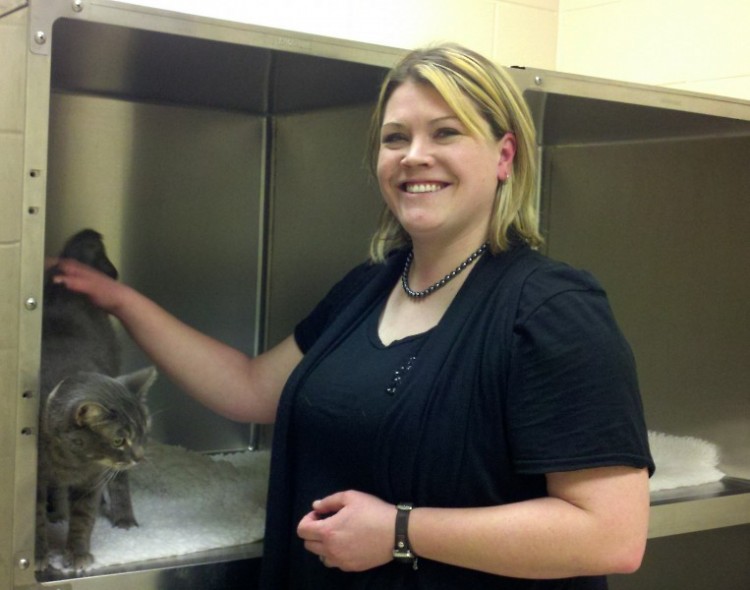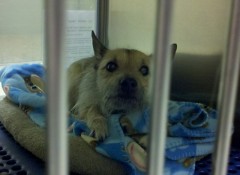Carly Luttmann is making great strides to change the perception of the Kent County Animal Shelter (KCAS). Indeed, thanks to Luttmann and her staff, it's clear the animal shelter is not your father's “dog pound.”
Aside from the 23,000-square-foot facility, opened in 2009, several programs have been instituted, all in an effort to educate the public about responsible pet ownership and about KCAS' adoption program.
“It's not cold and scary, and the animals are not sitting in water and they aren't looking sad and forlorn,” said Luttmann, program supervisor of the animal shelter. “They're getting some interaction with the staff, and all the work we've been doing is to get the animals to interact positively with people and for the people to have a positive experience when they come here.”
The animal shelter took in 7,792 animals (dogs, cats, ferrets and others) last year, an increase from 7045 in 2010. Sadly, euthanasia rates for 2010, as reported in the annual Michigan Shelter Report, are alarmingly high, especially for cats. A total of 3,818 kittens and cats were admitted in 2010, and 3,000 of those were euthanised. Only 134 were adopted via Kent County Animal Shelter while 36 were returned to owners and 637 were transferred to other facilities that might offer a better chance for adoption.
The 2010 numbers - shelters have until March 31 to report 20111 statistics to the Michigan Department of Agriculture - for dogs are a bit better, with 418 of the 3,023 dogs and puppies admitted in 2010 getting adopted, 643 returned to owners, 211 transferred and 1,722 euthanised.
Luttmann is doing her best to lower euthanisia rates at her facility by making the public aware of KCAS' adoption program. In addition to off-site visits to schools and various animal welfare events around town, KCAS dogs will march in Grand Rapids' St. Patrick's day parade sporting “Adopt Me” shamrock blankets, and her staff will bring adoptable dogs to the West Michigan Pet Expo at DeltaPlex Arena on March 31 and April 1.
“First and foremost, I want people to know they can adopt animals here,” Luttmann said. “We get a lot of people who don't even understand. They know it's a place to drop off animals, but not a place to get one. If you're in the market to get a new pet, adopt from us or the humane society or one of your local organizations, and don't contribute to the pet overpopulation and breeding going on in the community.”
Vicky's Pet Connection has helped lower the cost of cat adoptions at KCAS by sponsoring half the adoption fee for cats 8 months and older, so those cats can be adopted for just $25 plus the spay ($70) or neuter ($55) fee if the cat is not yet “fixed.”
“It's hard for area shelters to be able to adopt out cats because we get so much competition with the 'free kitten' ads in the paper, and people don't realize what a good value it is and how much healthier of an animal they're going to get if they get it from an area shelter.” Luttmann said. “All these guys are going to be tested for feline leukemia and feline immunodeficiency virus, they're going to be up to date on their distemper vaccine and rabies vaccine. They've had good health care and any kind of parasites they've had they'll be treated for before they go home.”
Every animal adopted from the shelter is spayed or neutered, as required by law, and microchipped. Adopting from the animal shelter will cost $80-$95 for a cat, $105-$120 for kittens and $162-$172 for a dog (plus the applicable license fee). Lisa LaPlante, marketing and communications manager for the Kent County Health Department, points out the cost of spay/neuter and vaccinations can add up for “free” kittens or puppies people take in.
“If they get [a cat] here, the expense is a lot lower than if you were to get a cat form someone who gives away free kittens,” LaPlante said. “The veterinarians here are a lot less expensive than the typical private ones.”
Training and equipment are a couple of subtle, but important, changes instituted at the shelter. Luttmann and her staff have been clicker training animals, rewarding positive behavior with treats.
“Instead of getting the normal, natural behaviors that we seem from dogs in an isolated kennel society, like barking, jumping up on the gate and trying to get your attention, we actually work with them throughout the day as well as at feeding time, getting them calm and learning nice greeting behaviors,” Luttmann said. “We have them sitting, waiting, before they come attacking the food bowl, and hanging back and sitting when we leash them or when we put them back in the kennels so they're just nicer and calmer and keeping their feet on the floor. When people are walking up to the kennels to see them they're not getting hit with this unruly beast that's trying to pull down the kennel gate to get to them, but rather a dog that when it sees a person has learned through the staff interaction the response is to sit nicely and give nice eye contact.
“It has a big impact. It allows us to be able to take dogs when we do adoption visitations and show off to people that the dog might know some commands already, which makes them more adoptable.”
Luttmann also has tossed out the old method of using “choke” chains for dog walks, opting instead for Gentle Leaders, Easy Walk harnesses and non-slip Martingale collars, all of which have been donated.
“It used to be everything was on choke chains,” Luttmann said. “We don't want that choking and negative reinforcement, because you know their life is hard enough anyway when they're in here, and they don't need to go for a walk and get choked around the complex. Want them to have a relaxing walk, get some energy out and not be frustrated at the same time. These are simple things that are easy to switch out and they make a big difference.”
Luttmann and LaPlante both are big on educating the public on responsible pet ownership so animals don't end up in their facility in the first place.
“When people come in to pick up their dogs, we talk to them about making sure they're doing all the things right, making sure the dogs are socialized well in a home and not brought back here two weeks later,” LaPlante said. “And there's something really simple people can do when they get a dog, and that is microchip. For $20 here, you've got a constant registration on the dog, not like a leash or tags that can come off. It's on that dog the rest of the dog's life, and it works wonders.”
Luttmann said any owner can bring their dog to KCAS for the $20 microchipping process, and added it's a simple procedure that takes just a few minutes. She also said her organization is making a push toward getting more Kent County dogs legally licensed.
“It's really easy and it doesn't take a lot of effort,” Luttmann said. “If they have their rabies vaccine, they just need to bring in the certificate. They can do it here, online or in the mail. The community is going to see a lot more presence from animal control, following up and making sure people are getting their licenses taken care of and handing out citations if not. We're doing a lot more education and enforcement on that level.
“We've targeted areas for opportunity and growth with our licensing program and we think we can get more people licensed. It's not only a great way to get your dog home if it gets lost, it has a lot to do with public safety, in keeping people safe from animals who could get infected with rabies and that sort of thing. It's a big deal, and we need to get more people involved in it.”
Adoption and licensing through KCAS
Kent County Animal Shelter
Location: 740 Fuller Avenue NE, Grand Rapids, 49503
Phone: (616) 632-7300
Hours: 10 a.m. to 6 p.m. Monday-Friday, 8 a.m. to noon on Saturdays
Adoption fees
Cats 8 months and older: $25 plus neuter ($55) or spay ($70) fee
Cats 2-7 months: $50 plus neuter ($55) or spay ($70) fee
Cat adoption fee covers feline leukemia/FIV test, RCPC vaccination and microchip
Dogs: $70 plus neuter ($80) or spay ($90) fee and applicable license fee
Fee covers heartworm test, DHLPP vaccine, rabies vaccine, bordetella vaccine and microchip
Dog licensing (fees double after March 1)
Required for all Kent County dogs older than 4 months (proof of rabies vaccination is required).
Fees (through March 1): $12 for spay/neutered dogs, $26 for intact dogs; $6 for senior owners of spayed/neutered dogs, $12 for intact dogs of senior owners. Fees double after March 1.
Purchase tags: Kent County Animal Shelter, county treasurer, city and township treasurers , Humane Society of West Michigan, Vicky's Pet Connection Critter Cottage, C-SNIP, by mail or online (through March 1)
The Rapidian, a program of the 501(c)3 nonprofit Community Media Center, relies on the community’s support to help cover the cost of training reporters and publishing content.
We need your help.
If each of our readers and content creators who values this community platform help support its creation and maintenance, The Rapidian can continue to educate and facilitate a conversation around issues for years to come.
Please support The Rapidian and make a contribution today.


